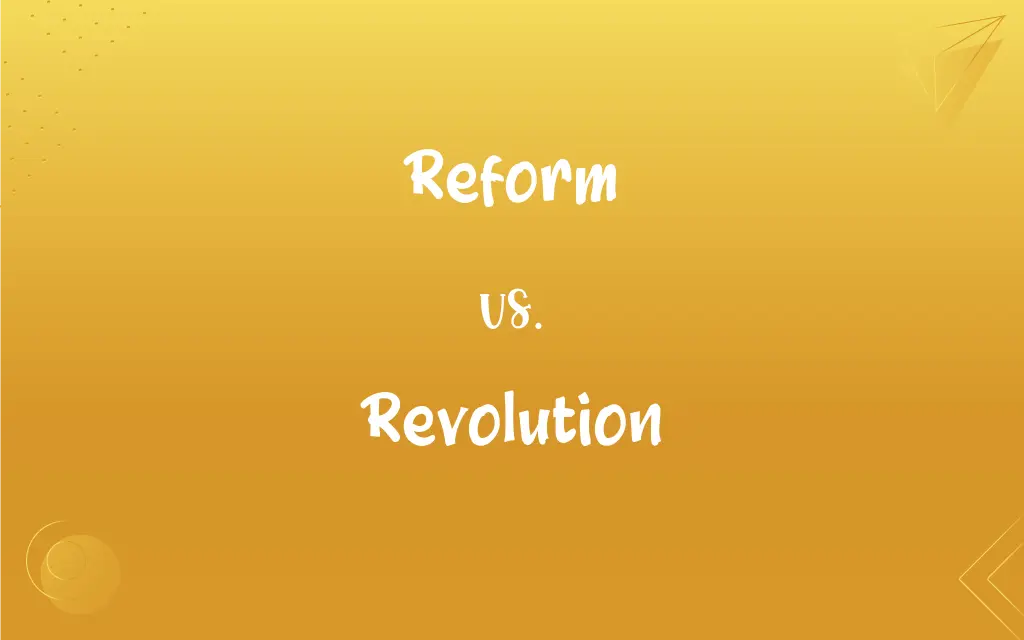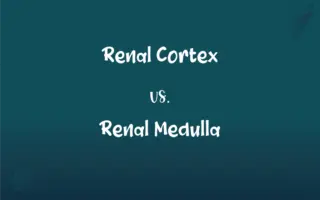Reform vs. Revolution: What's the Difference?
Edited by Aimie Carlson || By Harlon Moss || Published on December 28, 2023
Reform is gradual change within existing structures; revolution is a radical, often sudden overhaul of an entire system.

Key Differences
Reform implies gradual, often legislative or policy changes within existing systems. Revolution, in contrast, entails a complete and rapid overhaul of existing structures, often through more extreme means.
Reform usually brings about moderate changes and adjustments. Revolution leads to profound, widespread changes, affecting all aspects of the system.
Reform is typically achieved through dialogue, negotiation, and legal processes. Revolution often involves conflict, uprising, or a complete break from the current regime.
Reforms are implemented over time, aiming for long-term stability within the system. Revolutions, while immediate, can lead to a period of instability and uncertainty.
The goal of reform is to improve and rectify the system without dismantling it. The goal of revolution is to completely replace the existing system with a new one.
ADVERTISEMENT
Comparison Chart
Nature
Gradual, incremental changes
Rapid, radical overhaul
Methods
Legal, dialogue, negotiation
Uprising, conflict, complete break
Impact
Moderate, within existing structures
Profound, affecting entire system
Duration
Long-term implementation
Immediate, often followed by instability
Goal
Improve and rectify current system
Replace existing system with a new one
ADVERTISEMENT
Reform and Revolution Definitions
Reform
The amendment of conduct, especially morally or politically.
The new leader promised political reform to combat corruption.
Revolution
A dramatic and wide-reaching change in conditions, attitudes, or operation.
The digital revolution transformed how we communicate.
Reform
An improvement or amendment of what is wrong, corrupt, or unsatisfactory.
The government's tax reform aimed to simplify the system.
Revolution
An overthrow and thorough replacement of an established system.
The French Revolution drastically changed the political landscape of France.
Reform
A correction or improvement in a legal system.
Judicial reform was essential to ensure fair trials.
Revolution
A radical and pervasive change in society and social structure.
The industrial revolution marked a significant shift in economic and social structures.
Reform
A change in an institution, practice, or policy for the better.
The education reform initiative focused on inclusive learning.
Revolution
A fundamental change in power or organizational structures.
The revolution led to the fall of the monarchy and the rise of a new regime.
Reform
To bring about a change in, especially to improve.
The CEO's vision was to reform the company's culture.
Revolution
A movement intended to bring about radical change.
The revolution aimed to disrupt the status quo and implement major reforms.
Reform
To improve by alteration, correction of error, or removal of defects; put into a better form or condition
Reform the tax code.
Revolution
Orbital motion about a point, especially as distinguished from axial rotation
The planetary revolution about the sun.
Revolution
A turning or rotational motion about an axis.
FAQs
What is reform?
Reform refers to making changes to improve a system, often gradually.
What methods are common in reform?
Reforms typically use legal means, negotiations, and policy changes.
What methods are common in revolutions?
Revolutions often involve conflict, uprisings, or complete regime change.
Are revolutions always violent?
Not always, but they often involve conflict or radical change methods.
Can reform and revolution coexist?
Yes, sometimes reforms are introduced in response to revolutionary pressures.
Can reform lead to revolution?
Sometimes, if reforms are inadequate, they can lead to revolutionary demands.
How do reform and revolution differ in pace?
Reform is gradual; revolution is usually rapid and sudden.
What is the main goal of reform?
To improve or correct issues within an existing system.
What is an example of reform?
Introducing new environmental regulations to combat pollution.
What is revolution?
Revolution involves a significant, often rapid, change or overthrow of a system.
What is an example of a revolution?
The American Revolution, which led to independence from British rule.
Do reforms always succeed?
Not always, as success depends on various factors like public support and implementation.
Can revolutions be peaceful?
Yes, some revolutions, like the Velvet Revolution, have been largely peaceful.
What drives a revolution?
A desire for radical, foundational change in a system.
Do revolutions always lead to better outcomes?
Not necessarily, as they can sometimes lead to instability or unintended consequences.
How do reforms impact society?
They usually bring incremental improvements and stability.
How long do reforms take to implement?
Reforms can take months to years, depending on their scope and complexity.
How do revolutions impact society?
They often cause significant shifts in power, social structures, and policies.
Is it easier to implement reform or a revolution?
Implementing reform is generally easier, as it involves less upheaval.
Are revolutions predictable?
Revolutions can sometimes be unpredictable in their occurrence and outcomes.
About Author
Written by
Harlon MossHarlon is a seasoned quality moderator and accomplished content writer for Difference Wiki. An alumnus of the prestigious University of California, he earned his degree in Computer Science. Leveraging his academic background, Harlon brings a meticulous and informed perspective to his work, ensuring content accuracy and excellence.
Edited by
Aimie CarlsonAimie Carlson, holding a master's degree in English literature, is a fervent English language enthusiast. She lends her writing talents to Difference Wiki, a prominent website that specializes in comparisons, offering readers insightful analyses that both captivate and inform.






































































